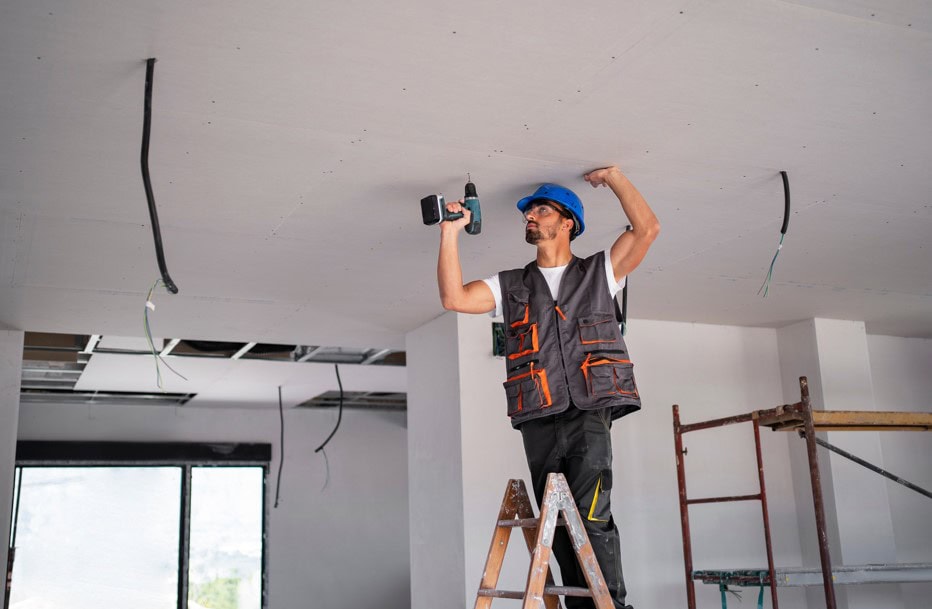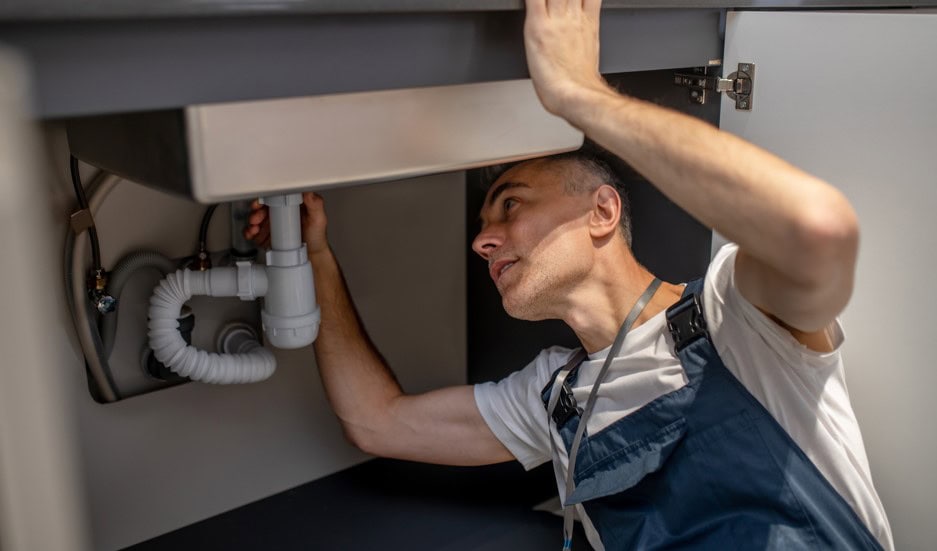Owning a home brings a sense of pride and accomplishment but also requires an ongoing commitment to maintaining the property. Various aspects of your home, from the roof to the foundation, will need repairs.
Understanding the most common home repairs and knowing how to prevent major damage can help you save money and avoid the hassle of unexpected issues. Below are some homeowners’ most common repairs and tips for addressing them.
Let’s get straight to the point.
Owning a home means taking responsibility for various repairs over time, including roof leaks, water heater failures, foundation cracks, and siding damage. Regular maintenance and prompt attention to minor issues can help avoid costly repairs. Key areas often needing attention include HVAC systems, plumbing (leaks and burst pipes), electrical issues, septic systems, and mould growth.
Proper care, such as scheduled inspections, routine cleaning, and professional check-ups, can prevent major issues. By staying proactive, homeowners can maintain their property’s value and prevent expensive breakdowns.
1. Roof Repairs
Your home’s roof protects the structure from weather elements such as rain, wind, and sunlight. However, over time, your roof can suffer from wear and tear, leading to leaks, missing shingles, and more serious issues. Neglecting minor problems can lead to larger, more expensive repairs in the future.
Common Roof Problems
- Leaks: Water leaks through the roof are among the most common issues, especially during the rainy season.
- Missing or damaged shingles: Exposure to the elements can cause shingles to crack or go missing, compromising the roof’s ability to protect your home.
Roof Maintenance Tips
- Regular inspections: Schedule a roof inspection at least once a year to catch any small issues before they become major problems.
- Prompt repairs: If you notice any missing shingles or small leaks, address them immediately to avoid water damage inside your home.
A well-maintained roof can last for decades, but paying attention to it may result in expensive replacements that cost thousands of dollars.
2. Water Heater Failures
The water heater is a critical component of any home, providing hot water for showers, dishwashing, and laundry. Most homeowners take their water heaters for granted until something goes wrong. A broken water heater can cause everything from cold showers to major flooding.
Signs Of A Failing Water Heater
- Inconsistent water temperature: If your water is not getting hot enough, your water heater may need repairs.
- Unusual noises: Clanking or rumbling from your water heater can signal a problem.
- Leaks: Water pooling around the base of your water heater is a clear sign that it needs repairs.
Water Heater Maintenance Tips
- Flush the tank: Regularly draining your water heater helps remove sediment buildup, extending its life.
- Professional inspections: Have a licensed technician check your water heater every few years to ensure it’s functioning correctly and to catch any issues early.
Water heaters typically last between 5 and 10 years, but regular maintenance can prevent premature failures and expensive repairs.

3. Foundation Damage
Your home’s foundation is arguably its most important component, providing the structural support needed to keep everything in place. Unfortunately, foundation damage can occur due to soil movement, water intrusion, or even natural wear over time.
Warning Signs of Foundation Issues
- Cracks in walls and floors: Visible cracks, especially around door frames and windows, may indicate foundation movement.
- Uneven floors: Floors that slope or feel uneven can also point to foundation problems.
- Doors and windows sticking: Difficulty opening and closing doors or windows is often linked to shifting foundations.
Foundation Repair Tips
- Monitor changes: Monitor cracks and other structural issues to catch problems early.
- Water drainage: Ensure proper water drainage around your home to prevent water from pooling near the foundation, which can weaken it over time.
Foundation repairs can be costly, often costing tens of thousands of dollars. Early intervention is the best way to prevent further damage and save on repair costs.
4. Siding Repairs
Your home’s siding contributes to its aesthetic appeal and serves as a protective barrier against the elements. Damaged siding can lead to moisture penetration, insect infestations, and rot, which can cause serious problems for your home’s structure.
Common Siding Issues
- Cracks or holes: Any gaps in the siding allow moisture and pests to enter, causing further damage over time.
- Warping: Prolonged exposure to the sun can cause the siding to warp, compromising its protective properties.
Siding Maintenance Tips
- Regular inspections: Check your siding regularly for cracks, holes, and other signs of damage, especially after extreme weather events.
- Caulking maintenance: Ensure the caulking around windows and doors is intact to prevent water infiltration.
Replacing damaged siding is often a straightforward repair, but neglecting it can cause extensive damage, resulting in a costly replacement.
5. HVAC System Breakdowns
Your home’s HVAC (Heating, Ventilation, and Air Conditioning) system keeps the interior comfortable, regardless of the weather outside. However, HVAC systems require regular maintenance to continue operating efficiently. A broken HVAC unit can leave you without heat in the winter or air conditioning in the summer.
Common HVAC Issues
- Noisy operation: Strange sounds like banging or rattling may indicate a problem with your HVAC unit.
- Inconsistent temperature: If some rooms are warmer or cooler than others, your HVAC system may need attention.
- System not turning on: This is often a sign of electrical issues or a failing system.
HVAC Maintenance Tips
- Change filters: Replace HVAC filters every 3-6 months to ensure proper airflow and efficiency.
- Regular servicing: Schedule professional maintenance twice a year to catch any issues early and extend the life of your HVAC system. Routine care can prevent costly breakdowns and keep your home comfortable year-round.
6. Septic System Failures
Homes not connected to municipal sewage systems rely on septic systems to manage waste. Septic systems require careful maintenance to avoid costly repairs or replacements.
Warning Signs of Septic Problems
- Foul odours: Unpleasant smells around your yard or home may indicate septic tank issues.
- Slow drains: If multiple drains are slow, it could indicate that your septic system needs attention.
Septic System Maintenance Tips
- Regular pumping: Have your septic tank pumped out every 3-5 years to prevent backups and overflows.
- Avoid harsh chemicals: Harsh chemicals can disrupt the bacteria in your septic tank, reducing its effectiveness. Proper care and maintenance can extend the life of your septic system and prevent messy, expensive failures.

7. Burst Pipes and Leaks
The pipes in your home supply water to various rooms and appliances. A burst pipe or slow leak can cause significant water damage, especially if it goes undetected for a long time.
Common Plumbing Problems
- Leaking pipes: Water stains or damp patches on walls or ceilings may indicate a leaking pipe.
- Reduced water pressure: A sudden drop in water pressure can also signal a plumbing issue.
Plumbing Maintenance Tips
- Address leaks immediately: Fix small leaks as soon as you spot them to prevent major water damage.
- Turn off the water supply: If you suspect a burst pipe, shut off the main valve and contact a plumber. Proactive plumbing maintenance can help avoid costly water damage and the inconvenience of major repairs.
8. Electrical Issues
Your home’s electrical system powers everything from your lights to your appliances. Electrical problems can be dangerous if left unresolved, potentially leading to fires or electrocution.
Warning Signs of Electrical Problems
- Flickering lights: This could indicate faulty wiring or a problem with the electrical circuit.
- Tripped circuit breakers: Frequent tripping of circuit breakers may mean your system is overloaded.
Electrical Repair Tips
- Hire a professional: Always contact a licensed electrician to handle electrical repairs, as working with electricity can be hazardous.
- Regular inspections: Inspect your electrical system every few years to ensure everything works safely.
Addressing electrical issues promptly can prevent fire hazards and keep your home’s systems running smoothly.
9. Mould Damage
Mould can develop in areas with high moisture levels, such as bathrooms, kitchens, and basements. Mould causes structural damage and poses health risks, especially for individuals with allergies.
Signs of Mould Growth
- Musty odours: A persistent smell is often the first sign of mould.
- Discoloured walls or ceilings: Dark spots or stains may indicate mould behind the surface.
Preventing Mould Growth
- Fix leaks immediately: Any leaks in plumbing or roofing should be addressed immediately to prevent mould.
- Ventilation: Ensure areas prone to moisture, such as bathrooms, are well-ventilated to reduce humidity.
Catching mould problems early can prevent further damage and protect your home’s structural integrity.
10. Flooring Repairs
Floors endure a lot of wear and tear from daily foot traffic, furniture, and accidental drops. Over time, they may show signs of damage, such as cracks, loose tiles, or scratched surfaces.
Common Flooring Issues
- Cracked tiles: Tiles can crack over time, especially in high-traffic areas.
- Squeaky wooden floors: Wooden floors may develop squeaks or loosen with age.
Flooring Maintenance Tips
- Fix loose tiles: Repair or replace cracked or loose tiles to avoid further damage.
- Regular cleaning: Regularly sweep and mop your floors to prevent scratches and wear. Caring for your floors can extend their lifespan and avoid costly replacements.
Conclusion
Owning a home means being prepared for common home repairs that come with time and use. From minor fixes like repairing loose tiles to more significant issues like foundation repairs or roof leaks, staying on top of regular maintenance can save you from more extensive (and expensive) problems down the road.
Having the right tools and knowing when to call a professional can help ensure your home stays in excellent condition for years. Regular inspections and addressing small issues early can help prevent major repairs later.
FAQs On Home Repair
What Is Renovation Process?
The term ‘renovation’ refers to returning something to a good state of repair. Renovation refers to improving or modernising an old, damaged, or defective building in the construction industry.
Should You Do Floors Or Walls First?
The answer is, “Do the floors first!” Here’s why: Removing and replacing flooring or carpeting is dirty work. If you paint first and then do floors, there is a good chance that a lot of dirt, dust, sawdust, or tile/stone dust will end up on your freshly painted walls and trim.
What Is The Main Purpose Of Renovation?
Renovation (also called remodelling) is the process of improving a broken, damaged, or outdated structure. Renovations are typically either commercial or residential.
What Are The Different Types Of Renovation?
There are four renovation projects: the basics, curb appeal, the best bang for the buck, and passion projects.
What Is Included In A Renovation?
In a renovation, a kitchen remains a kitchen, and a bedroom remains a bedroom, but repairs and updates are made. This generally includes such things as painting, installing new flooring, and switching out items like cabinet knobs and faucets. The renovation also includes structural rebuilding.

